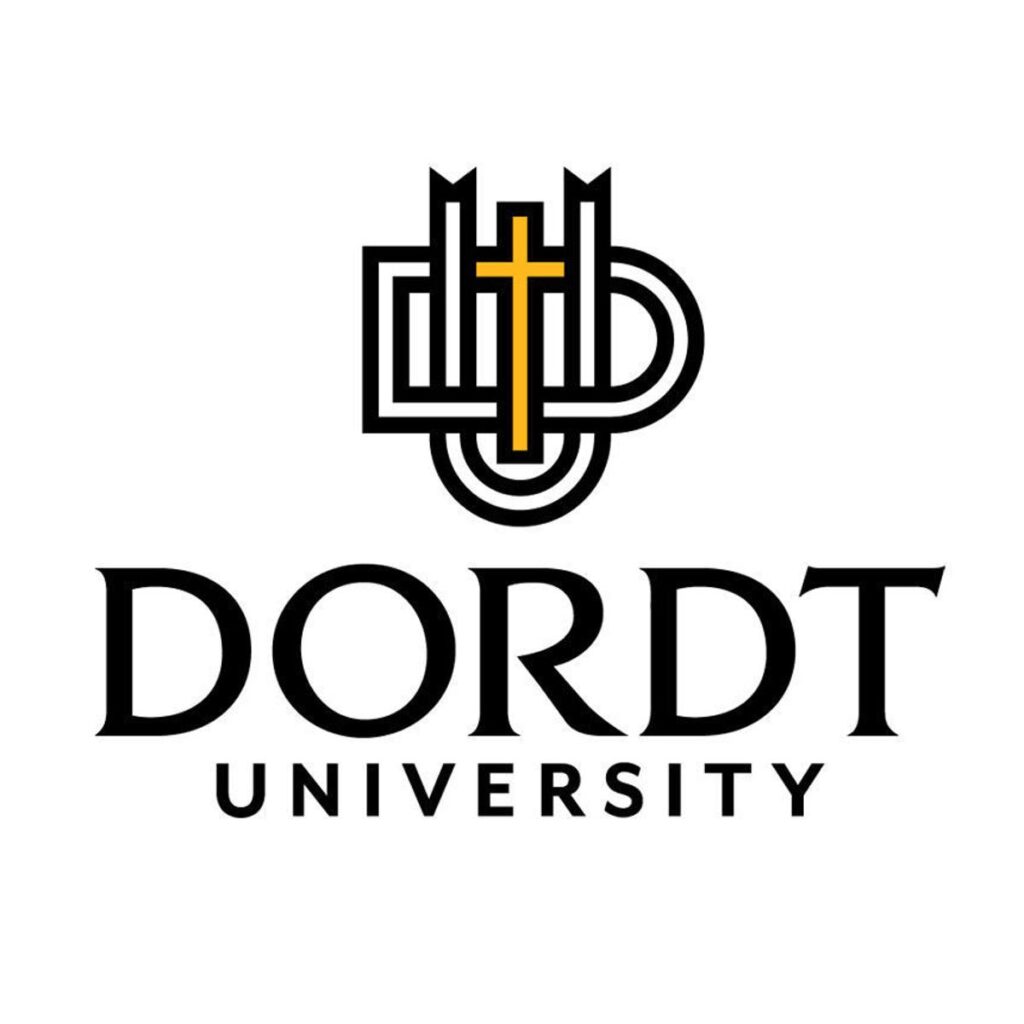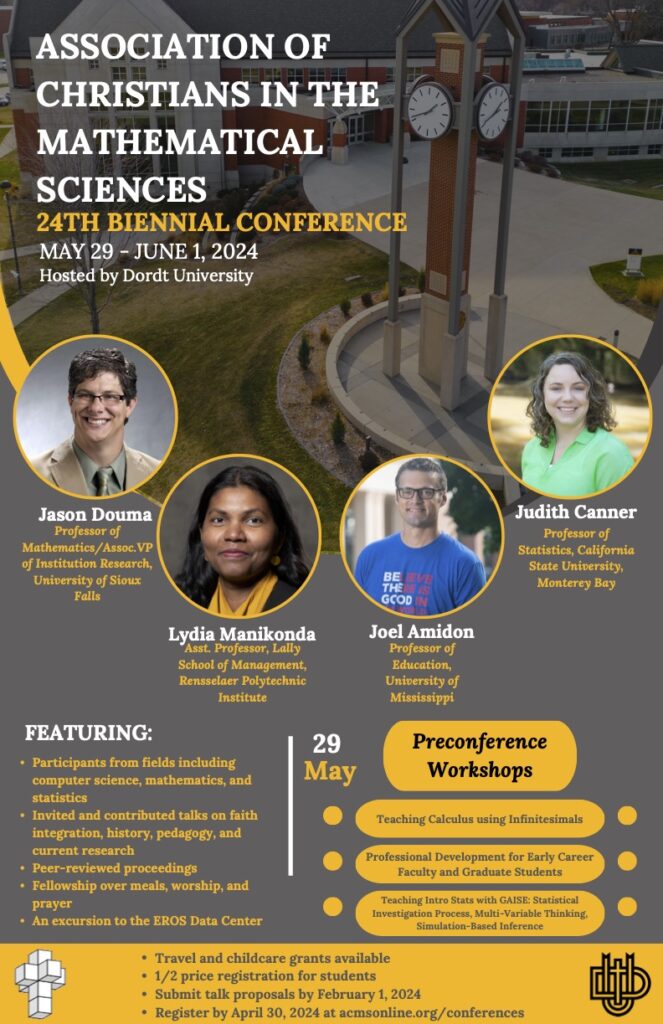

24th ACMS Biennial Conference
May 29-June 1, 2024
Dordt University, Sioux Center, IA 51250
The Association of Christians in the Mathematical Sciences and the Dordt University Department of Mathematics and Statistics will be hosting the 24th ACMS Biennial Conference on May 29 – June 1, 2024 with optional preconference workshops on May 28 – 29. (See Dave Klanderman’s blog post in Christian Scholar’s Review for his perspective on ACMS conferences.)
Registration for the Dordt conference is closed.The main conference will begin with dinner on May 29 and will conclude with lunch on June 1. The conference will feature invited and contributed talks on history, pedagogy, faith integration, and current research in disciplines including computer science, mathematics, and statistics. Participants will enjoy fellowship over meals, worship and prayer, and a choice of excursion to either the Eros Data Center (USGS) or the SiouxNami Waterpark. There will be a formal banquet on Friday evening followed by an informal social time in the Gaming Guild Bunker.
Invited Speakers
- Joel Amidon, University of Mississippi (Math-Education)
Title: Teaching Mathematics as Agape
Abstract: What does it mean to teach mathematics from a perspective of unconditional love? In this presentation, the speaker draws upon biblical principles, practitioner innovations, and inclusive teaching methods to conceptualize and illustrate an ideal relationship between students and mathematics. This relationship is characterized as functional, communal, critical, and inspirational, all stemming from a commitment (and passion) to teach mathematics as agape.
- Judith Canner, Cal State Monterey Bay (Statistics)
Title: Putting on Compassion: Ethics in a Data-Driven World
Abstract: Data and compassion are not often paired together. We tend to think of data as some neutral record of the facts, and “facts” do not need “feelings” to support their meaning. But is that true? In response to our salvation through Jesus Christ, we are instructed to “put on compassion, kindness, humility, gentleness, and patience…” (Col 3:12), but the practical implications of that calling require us to examine our ethical framework as we approach our roles as both statistical educators and practitioners. If we integrate discussions of ethics and compassion into our classrooms through pedagogical frameworks that allow us to navigate difficult and sometimes divisive topics, we can train the next generation of statisticians and data scientists to bring about change to systems that seem unchangeable. With that goal in mind, we will explore compassion as the foundation for ethical practices in data collection and privacy; data analysis and inference; the communication of data; and pedagogical practices for teaching each of these topics.
- Jason Douma, University of Sioux Falls (Mathematics)
Title: Does 3 belong to 17? (and other absurd questions)
Abstract: Paul Benacerraf famously told a story about two budding mathematicians (Ernie and Johnny) who could not agree on whether 3 “belongs” to 17. On its face, this seems a pointless argument to entertain. The question is marginally well-defined and most likely irrelevant to the actual practice of mathematics. However, the answer to the question—or more precisely, the difficulty in obtaining an answer to the question—does tell us something about the nature of the subject matter with which we work. This talk will examine what might be learned by pondering “absurd questions” in mathematics, including Benacerraf’s little gem.
- Lydia Manikonda, Rensselaer Polytechnic Institute (Computer Science)
Title: The Pursuit of AI and the Future of Health
Abstract: The growing ability to process enormous amounts of data at a highly efficient speed and with lower costs has paved the way for developing intelligent Artificial Intelligence (AI) systems that attempt to mimic humans. Despite this rapid growth of AI, it remains unclear how we can efficiently deploy this technology to solve real-world problems, especially in healthcare. Drawing on the insights from my inter-disciplinary research, this talk showcases the different aspects of modeling unstructured natural language data for decision-making and sheds light on different ethical challenges involved in this process.
Pre-Conference Workshops
Three pre-conference workshops will be held concurrently from Tuesday afternoon through Wednesday. Participants may choose one of the following options:
Workshop 1: “Teaching Calculus with Infinitesimals”, Brian Dawson
Have you ever wondered what a modern approach to teaching calculus using infinitesimals might look like? This workshop is your chance to find out! Come and learn recently developed (within the last dozen years) notation and procedures that can make calculus look and feel more intuitive, how the algebraic burden with limits and other topics can be reduced, and how the course can be infused with fresh mathematical thinking. No prior experience with infinitesimals is needed; the workshop will include numerous opportunities to practice the techniques and learn how they are implemented in the classroom. Topics include infinitesimals, approximation, limits, the derivative and proofs of derivative rules, a simpler replacement for Riemann sums, a simpler test for series convergence, and more, all from the author of Calculus Set Free: Infinitesimals to the Rescue (Oxford University Press, 2022). A preview of Multivariable Calculus Set Free is also planned. Student reaction to these infinitesimal methods has been enthusiastic; come and see how your students could benefit!
Workshop 2: “Early Career Professional Development”, Kristin Camenga, Derek Schuurman, and Amanda Harsey Ramsay.
Discuss and reflect on core areas of faculty work through workshops and stories from experienced faculty. Topics include teaching, scholarship, service, faith integration, the job search, and promotion & tenure.
Workshop 3: “Teaching Introductory Statistics with GAISE: Statistical Investigation Process, Multi-Variable Thinking, Simulation-Based Inference”, Nathan Tintle.
In this workshop, participants will be immersed in hands-on activities for introducing students to statistical concepts, with a focus on: the statistical investigation process, multi-variable thinking and simulation-based inference. We will also provide experience with freely available software tools for exploring statistical concepts and analyzing real data, examine assessment items and techniques, and discuss common student misconceptions. To maximize post-workshop impact, all participants will be invited to join an NSF-sponsored (NSF-DUE-2235355) virtual community of statistics teachers which provides ongoing support, resources and additional professional development opportunities. Ultimately, we hope to move faculty participants closer to teaching introductory statistics effectively in accordance with the American Statistical Association’s GAISE recommendations (www.amstat.org/gaise).
Session Proposals
Please use this form to submit your proposal for a presentation during one of the parallel sessions. Most talks will be 15 minutes, but we may be able to accommodate a limited number of 25-minute talks. If you would like to be considered for a 25-minute slot, then please indicate that below. The deadline for presentation proposals is March 1, 2024, but early submissions are encouraged.
Those who present at the conference will have the option to submit a paper by August 31, 2024 for the conference proceedings, which will be peer-reviewed.
Travel Information
Sioux Falls Regional Airport (FSD), 60 miles from Dordt University, is the recommended airport in the region. Shuttle service from FSD to Dordt will be available at various times for a fee of $25. Sioux City, IA (SUX), also has an airport with limited flights and Omaha, NE (OMA), is approximately a two-hour drive from Dordt. Participants may choose to rent a car for added flexibility in travel plans. (Ride services are limited in the rural area around Dordt University.) The organizers recommend participants fly into Sioux Falls and use the shuttle service. Fill out this form, by April 30, to help conference organizers arrange shuttle service.
There is a Google sheet to help individuals flying into SUX, OMA, or MSP to coordinate ride sharing. Contact one of the conference Co-Chairs listed below for access to the spreadsheet. Do note that Lyft and Uber are extremely limited in Sioux Center due to its rural locale.
Lodging
Lodging is available on campus in the Kuyper Apartments. See prices in registration form. For those not wanting to stay on campus there is a Holiday Inn Express and Suites, The Econo Lodge, and, opening in April, Fairfield Inn and Suites.
Travel and Child-Care Grants
The ACMS will provide a limited number of reimbursement grants of (up to) $250 for childcare or travel. To be eligible for these grants, you must join the ACMS or renew so that your membership is current through December 31, 2024 and register for the 2024 conference.
Childcare grants may be used to help with the cost of childcare for registered participants of the 2024 conference. The funds may be used for child care that frees a parent to participate more fully in ACMS. Travel grants are intended to assist those who plan to attend the conference but are unable to obtain the necessary funding from an academic institution or other organization.
To apply, complete this form. Applications will be accepted until March 1, 2024. Final decisions on recipients will be made on or before April 1, 2024. All grant funds will be provided in the form of a check which will be issued at the ACMS conference.
Additional Information
Direct all questions to Tom Clark (Tom.Clark@dordt.edu) or Val Zonnefeld (Valorie.Zonnefeld@dordt.edu).